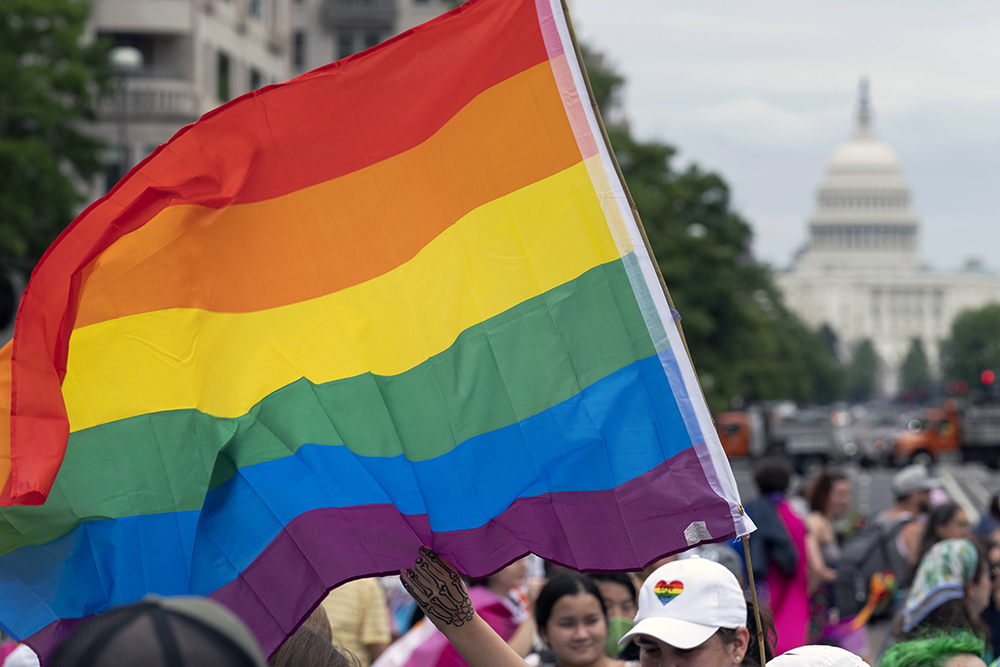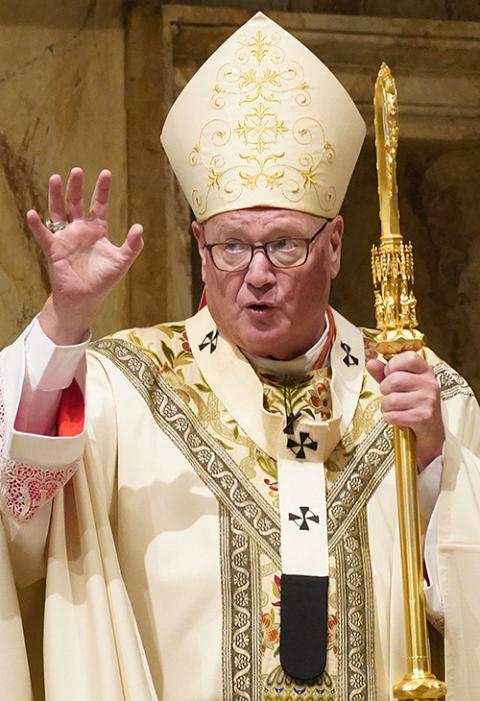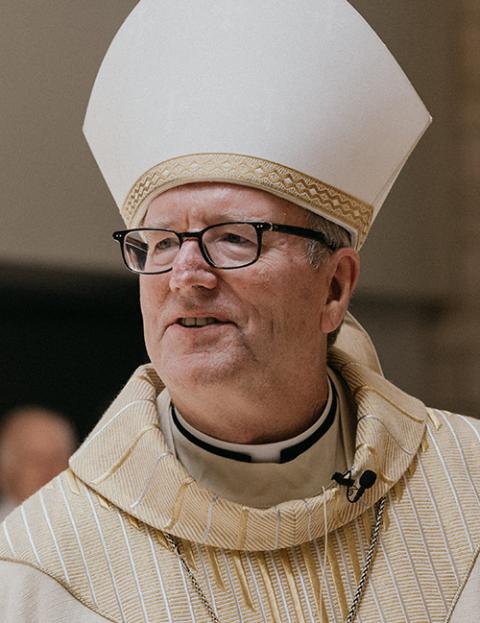
With the U.S. Capitol in the background, a person waves a rainbow flag as they participant in a rally in support of the LGBTQIA+ community at Freedom Plaza June 12, 2021, in Washington, D.C. (AP/Jose Luis Magana, File)
A bipartisan bill to ensure national protection of same-sex marriage rights is inching closer to President Joe Biden's desk, thanks in large part to statements of support from religious leaders who oppose same-sex marriage but are satisfied with the bill's religious liberty protections.
However, the nation's Catholic bishops are continuing to sound a familiar alarm that the legal recognition of same-sex marriage — which has been the law of the land since the U.S. Supreme Court's 2015 decision in Obergefell v. Hodges — puts Catholic organizations at risk of government discrimination.
"The bill is a bad deal for the many courageous Americans of faith and no faith who continue to believe and uphold the truth about marriage in the public square today," New York Cardinal Timothy Dolan, chairman of the U.S. bishops' Committee for Religious Liberty, said in a Nov. 17 statement.
Twelve Republicans in the U.S. Senate joined Democrats in passing the bill, known as the Respect for Marriage Act, on Nov. 29. It still needs to clear the House of Representatives, expected in coming days, before Biden can sign it into law.
The bill requires states to recognize any marriage legally contracted in another state between two individuals regardless of their "sex, race, ethnicity, or national origin."

New York Cardinal Timothy Dolan imparts the final blessing during Mass Aug. 14 at St. James Cathedral Basilica in Brooklyn, New York. (CNS/Gregory A. Shemitz)
LGBTQ advocates have been pushing for the bill since the Supreme Court's June decision in Dobbs v. Jackson Women's Health, which overturned Roe v. Wade and struck down the national right to abortion.
Although the majority opinion in the Dobbs case said that ruling should not "cast doubt on precedents that do not concern abortion," Justice Clarence Thomas indicated in a concurring opinion that he thought the overturning of Roe could lead to the overturning of other landmark cases, including Obergefell, that rely on a similar legal framework.
"Knowing that we have heard justices signal their intent to want to review and potentially roll back protections for LGBTQ Americans is what made this legislation so incredibly important," Ross Murray, vice president of the GLAAD Media Institute, told NCR.
While providing legal recognition for married same-sex couples, the Respect for Marriage Act would also shield religious groups that oppose same-sex marriage from providing "any services, facilities, or goods for the solemnization or celebration of a marriage." The bill would prevent churches and religious nonprofits that decline to recognize same-sex marriage from having their tax-exemption status altered or stripped.
Murray, who is also a deacon in the Evangelical Lutheran Church in America, said the consultations between religious leaders and lawmakers to include a religious freedom amendment in the Respect for Marriage Act was "especially important in our political process."
"That consultation makes sure that religious groups know and understand why freedom of religion is still going to be upheld even with this bill going into law," Murray said.
'They are far too absolutist for their own good.'
—Douglas Laycock on the U.S. Catholic bishops
Those religious freedom protections garnered the endorsement of the Church of Jesus Christ of Latter-day Saints, a turnaround from its previous contribution of $22 million in 2008 to prevent the legalization of same-sex marriage in California and its earlier support for the Clinton-era Defense of Marriage Act, which barred the federal government from recognizing same-sex marriages and would now be repealed by the Respect for Marriage Act.
In recent years, the Latter-day Saints church has supported anti-discrimination measures to protect LGBTQ persons in Arizona and Florida.
"We believe this approach is the way forward. As we work together to preserve the principles and practices of religious freedom together with the rights of LGBTQ individuals, much can be accomplished to heal relationships and foster greater understanding," the Latter-day Saints church said in a Nov. 15 statement.
Other religious groups that do not recognize same-sex marriage but whose leaders thanked legislators for taking their religious liberty concerns seriously included the Seventh-day Adventist Church, the National Association of Evangelicals and the Orthodox Union of Orthodox synagogues.
"Thank you for partnering together on legislation that reflects bipartisan commitment to religious freedom and diversity," Melissa Reid, director of government affairs for the Seventh-day Adventist Church's North American Division, said in a statement.
However, the nation's Catholic bishops took a less sanguine view. In a joint Nov. 23 statement, Dolan and Bishop Robert Barron of Winona-Rochester, Minnesota, chairman of the bishops' Committee on Laity, Marriage, Family Life, and Youth, urged Congress to "reverse course on the harmful" bill.
"The Respect for Marriage Act's rejection of timeless truths about marriage is evident on its face and in its purpose. It would also betray our country's commitment to the fundamental right of religious liberty," Dolan and Barron wrote.
In a three-page analysis that accompanied their statement, the bishops suggested that the Respect for Marriage Act could result in the federal government revoking religious nonprofits' tax exemptions and forcing faith-based social service agencies to place foster and adopted children with same-sex couples or to place those couples in housing as if they were heterosexual married people.
"From the perspective of the U.S. Conference of Catholic Bishops, whose bishops' ministries comprise the largest non-governmental provider of social services in the United States, the provisions of the Act that relate to religious liberty are insufficient," the bishops wrote.
Echoing the dire warnings of socially conservative groups like the Alliance Defending Freedom and the Heritage Foundation, the Catholic bishops' negative analysis of the Respect for Marriage Act continues a yearslong trend of the bishops' conference opposing any federal legislation that recognizes LGBTQ rights, such as the Employment Non-Discrimination Act, the Violence Against Women Act, and the National Suicide Hotline Designation Act.
"They are far too absolutist for their own good," Douglas Laycock, a law professor at the University of Virginia Law School, told NCR in an email.
Advertisement
Laycock, who has studied the intersection of religious liberty and LGBTQ rights, writes in an upcoming essay for Commonweal that the bishops will oppose any legislation that provides any protection for same-sex marriage, because such legislation "rejects what is true and protects what is false," from the bishops' perspective.
"Compromise becomes impossible on this view, and if compromise is impossible, then legislative protection for religious liberty on these issues is also impossible," said Laycock.
Laycock, along with other constitutional law scholars, signed a letter, dated Nov. 16, to Sens. Susan Collins of Maine, a Republican, and Tammy Baldwin of Wisconsin, a Democrat, commending the religious liberty protections in the Respect for Marriage Act.
Thomas Berg, a law professor at the University of St. Thomas School of Law in Minnesota who also signed the Nov. 16 letter, told NCR that the bishops' analysis overstates the risks in the Respect for Marriage Act, which he said prohibits any government penalties on religious organizations that object to same-sex marriage.
The bishops' analysis argues that the bill will create a new compelling interest to authorize penalties on religious organizations, but Berg said that would be unlikely since an accompanying finding in the Respect for Marriage Act holds that traditional religious beliefs about marriage and gender are based on "decent and honorable" premises and deserve "respect."
"That finding is not meaningless," Berg said. "If RMA passes, defenders of religious liberty will rightly cite it to show that Congress treats the traditional man/woman view of marriage as very different from objections to interracial marriage — which gets no such declaration of respect in RMA."
'The bishops' conference needs to examine its priorities. They're still trying to fight battles that have been long lost.'
—Francis DeBernardo
Robin Fretwell Wilson, a law professor at the University of Illinois College of Law who also signed the Nov. 16 letter, told NCR that the bill's finding about "decent and honorable" opposition to same-sex marriage "seems to fly in the face" of what the bishops warn will be a new "compelling government interest" to force religious groups to violate their consciences.
"At the end of the day what [the bishops] are relying on is the position that if there is no recognition of same-sex marriage in statutory law, then that is the safest place for them. I think that's why their letters read the way they do," Wilson said.
The bishops have tried to marshal opposition to the bill for months. In July, San Francisco Archbishop Salvatore Cordileone and Baltimore Archbishop William Lori — in their former capacities as chairmen of the bishops' committees on laity, marriage, family life and youth, and pro-life activities, respectively — wrote to federal lawmakers that the Respect for Marriage Act would "do the opposite of what its name implies, codifying a demand for states and the federal government to honor whatever may be deemed 'marriage' by any other state."
In letters, public statements and published articles, the bishops articulated a position that only traditional marriage between one man and one woman is worthy of legal recognition. In an essay posted Nov. 15 on the bishops' conference website, Dolan wrote that the status quo of legalized same-sex marriage is "not acceptable" for "those who continue to believe in and offer support for the traditional model of marriage."
In that regard, Francis DeBernardo, executive director of New Ways Ministry, a Maryland-based nonprofit that advocates for LGBTQ Catholics, told NCR that the bishops are out of step with the majority of lay Catholics in the United States who favor allowing gays and lesbians to marry.
"The bishops' conference needs to examine its priorities," DeBernardo said. "They're still trying to fight battles that have been long lost."









